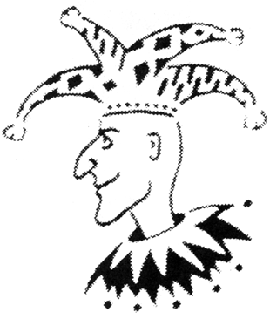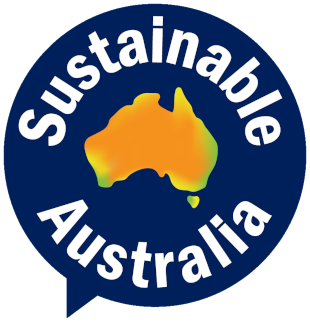Related Research Articles

The McGillicuddy Serious Party (McGSP) was a satirical political party in New Zealand in the late 20th century. Between 1984 and 1999, it provided "colour" to ensure that citizens not take the political process too seriously. The party's logo, the head of a medieval court jester, indicated its status as a joke party.

The Australia First Party (NSW) Incorporated, often shortened to the Australia First Party (AFP), is an Australian nationalist political party founded in 1996 by Graeme Campbell. The policies of Australia First have been described as ultranationalist, anti-multicultural and economically protectionist. The party's logo includes the Southern Cross of the Eureka Flag.

The Nuclear Disarmament Party (NDP) was an Australian political party formed in June 1984. It was founded by medical researcher Michael Denborough as the political arm of the Australian anti-nuclear movement, which had been active since the early 1970s.

The Green Party, also known as the Green Party UK, was a Green political party in the United Kingdom.

The Shooters, Fishers and Farmers Party (SFF) is an Australian political party. It primarily advocates for increased funding and services for rural and regional Australia, protecting the right to farm, enhancing commercial and recreational fishing, tougher sentencing for illegal firearm trade and usage, and relaxing gun control for law abiding citizens.

The Greens NSW, also known as the NSW Greens, is a green political party in New South Wales and a member of the Australian Greens. First formed in 1991, the Greens NSW began as a state-level party before joining with other green parties in Australia to create the current federated structure.
Legalise Cannabis Australia, formerly the Help End Marijuana Prohibition (HEMP) Party, is a single-issue Australian political party. It has a number of policies that centre around the re-legalisation and regulation of cannabis for personal, medicinal and industrial uses in Australia.

Lang Labor was a faction of the Australian Labor Party (ALP) consisting of the supporters of Jack Lang, who served two terms as Premier of New South Wales and was the party's state leader from 1923 to 1939. It controlled the New South Wales branch of the ALP throughout most of the 1920s and 1930s. The faction broke away to form separate parliamentary parties on several occasions and stood competing candidates against the ALP in state and federal elections.

Elections for the 54th Parliament of New South Wales were held on Saturday, 24 March 2007. The entire Legislative Assembly and half of the Legislative Council was up for election. The Labor Party led by Morris Iemma won a fourth four-year term against the Liberal-National coalition led by Peter Debnam.

James Saleam is an Australian far-right extremist and the chairman of the Australia First Party. Saleam has been described as a white nationalist, who has been a strong advocate of barring further immigration to preserve a "self-contained, predominantly white nation resistant to further immigration or watering-down of its culture". This is often considered ironic as Saleam is alleged to have mixed Lebanese ancestry; indigenous people of the Middle East, and in fact all non-Europeans, and even some Southern Europeans were once barred from immigrating to Australia until the 1950s under the White Australia policy. He has been observed wearing a swastika armband and associating with neo-Nazi skinheads.

The Non-Custodial Parents Party was a minor political party in Australia registered between 1999 and 2020. It supported less government control of many aspects of daily family life, focusing on reform of family law and child support.

Cannabis political parties are generally single-issue parties that exist to oppose the laws against cannabis.

The Sustainable Australia Party, formerly the Sustainable Population Party, is an Australian political party formed in 2010.
Kevin John Anderson is an Australian politician. Anderson is a member of the New South Wales Legislative Assembly representing Tamworth for the Nationals since 26 March 2011.

A general election for the 56th Parliament of New South Wales (NSW) was held on Saturday 28 March 2015. Members were elected to all 93 seats in the Legislative Assembly using optional preferential voting. Members were also elected to 21 of the 42 seats in the Legislative Council using optional preferential proportional representation voting. The election was conducted by the New South Wales Electoral Commission.

The Animal Justice Party (AJP) is a political party in Australia founded in 2009 by Steve Garlick. The party was registered by the Australian Electoral Commission (AEC) on 3 May 2011. The party is also registered in New South Wales, Queensland, South Australia, Victoria, Western Australia, Tasmania, Northern Territory, and the Australian Capital Territory. The AJP is the first political party in Australia formed solely to advance animal welfare issues.
The Voluntary Euthanasia Party (VEP) was a minor political party in Australia, founded in early 2013 by Corey McCann to advocate for legislative change to allow voluntary euthanasia in Australia. The party's inception was strongly supported by Dr Philip Nitschke, director of Exit International and Richard Mills, then President of Dying with Dignity NSW.

The Arts Party is an Australian political party inspired by the importance of the arts and creative action. The party was voluntarily deregistered with the Australian Electoral Commission on 25 June 2019, but remains registered for local elections with the New South Wales Electoral Commission.

Trisha Lee Doyle is an Australian politician who was elected to the New South Wales Legislative Assembly as the member for Blue Mountains for the Labor Party at the 2015 New South Wales state election.
An election for the leadership of the New South Wales branch of the Australian Labor Party was held between 7 and 29 June 2019. The election was triggered by the resignation of Leader Michael Daley on 25 March 2019. The election was a combined vote by the party membership and the Labor members of the Parliament of New South Wales, with each component weighted equally. The party members were sent their ballots on 7 June and had until 21 June to return them, while the parliamentary caucus met on 29 June to cast their votes.
References
- ↑ Earthsave - What We Believe
- ↑ Earthsave - Policies
- ↑ Baden Offord’s chapter in Belonging in the Rainbow Region (Helen Wilson, ed.; Southern Cross University Press, 2003
- ↑ Green, Antony: NSW Parliamentary Library Research Service's New South Wales Elections 1999
- ↑ "Local Residents - Blue Mountains, Australia". www.mcspotlight.org. Retrieved 16 October 2015.